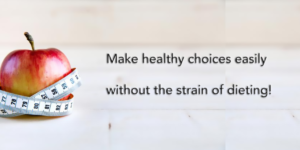Why It’s So Difficult To Lose Weight And Keep It Off
This year, about 45 million adults in the U.S. will go on a diet to shed some unwanted pounds. Maybe you’re one of those people. You’ve read a new diet book, downloaded an app, bought all the foods you need—this is the year you’ll make a big change, once and for all. The problem with “going on a diet” is you will eventually go off the diet—pretty much everyone does.
There’ve been lots of numbers thrown around the internet about the failure rate of diets. One popular statistic says that 95% of people who go on a diet regain all their lost weight within two years. This belief stems from Stunkard and McLaren-Hume’s 1959 study of 100 obese individuals, which indicated that two years after the treatment, only 2% maintained a weight loss of 20 pounds or more. Countless papers and articles quote that 95 to 97 percent figure, but no one has published additional research to support the number. It’s considered “clinical lore,” part of the mythology of obesity.

More reliable figures from research tell us that about 20% of overweight people succeed at losing at least 10% of their initial bodyweight and keeping it off for at least a year. That statistic comes from the National Weight Control Registry, a research study that includes people who have lost at least 30 pounds and kept it off for at least one year. The study has enrolled more than 10,000 members, making it perhaps the largest study of weight loss ever conducted.
In a meta-analysis of 29 long-term weight loss studies, more than half of the weight lost was regained within two years, and by five years, more than 80% of weight was regained. People find long-term weight management extremely challenging due to the interactions between our biology, behavior, and the fat-inducing environment we live in. We now have more highly processed, easily digestible, highly palatable foods at our fingertips than our brains can handle.
The other thing to understand—diets aren’t harmless. Medicare funded a study in 2007 to search for effective treatments for obesity. The study found that more than two-thirds of dieters regained more weight than they lost on their diets. The conclusion of the study stated, “there is little notion that diets lead to lasting weight loss or health benefits.”
So, let’s talk about some of the reasons diets don’t work.
1. Most diets are a radical change to your normal routine. Your brain likes normal, and it likes routines. That’s why about 40 percent of the actions we take on any given day are habits—actions we do automatically without even thinking about them. Your brain creates habits so it doesn’t have to work hard. You don’t put much mental effort into driving to work or brushing your teeth because they are habits.
Diets usually create a complete disruption of your normal eating habits. Very few people have enough willpower to fight habits their brain has spent years developing. Socrates once said, “Excessive action in one direction usually sets up a reaction in the opposite direction.” That pretty much explains why most people regain more weight than they lost after going on a diet.
2. Losing Weight Slows Your Metabolism. Losing weight quickly will typically cause you to lose a good deal of muscle, which will lower your metabolism. Researchers estimate that for each pound of weight you lose, your metabolism decreases by about 10 to 15 calories a day. Losing 30 pounds could reduce your metabolism by as much as 450 calories a day. That’s an impossible adjustment to ask your body to adapt to in a three-month weight loss program.
3. Losing Weight Increases Your Appetite. A recent study of 153 weight loss patients showed that for every pound lost, appetite increases by about 50 calories a day. So, the person who ends up losing 30 pounds in 12 weeks will also end up increasing their desire to eat by 1500 calories a day.
No wonder dieters end up binge eating and regain more weight than they lost. Very few of us have enough willpower to keep things in check when our metabolism slows by 450 calories, and appetite increases 1,500 calories.

Since 2013, our coaches at Exercise Inc have been able to help our clients lose more than 34,850 pounds. That number represents net weight loss over a long period of time. If a client loses weight in a week, we record that as a positive number for our weight loss records. If a client gains weight, we subtract from the number.
A key component of permanent weight loss—only make changes you’re willing and able to stick with for the rest of your life. Our Simple 9© nutritional program works because we coach our clients to adopt simple habits they can live with for life. The program is simple, but it isn’t easy. It requires discipline and accountability, which is where our coaches come in. The first four steps of our program are listed here, and here.
Another key component to successful weight loss—don’t restrict the amount of food you eat, or don’t count calories. No one can succeed long term on a weight loss plan that requires them to be hungry all the time. The Simple 9© allows you to eat as much of the right foods as you want.
One of the best approaches to achieving lasting weight loss—stop trying to lose weight and focus on being healthy. Our Simple 9© program focuses on developing healthy habits that are important for anyone to live a long, resilient life. Our last habit has to do with reducing stress because stressing about weight loss can prevent you from losing weight.
Strength training is also key for anyone wanting to successfully lose weight and keep it off long term. It requires a significant number of calories to recover from a strength training workout. It also requires extra calories to build muscle. And once you build that muscle, it will require extra calories to maintain that muscle. How many calories? No one knows for sure, but I can tell you it’s more than you would use if you didn’t have the muscle.
Stay Strong and Keep it Simple,
Bo Railey

